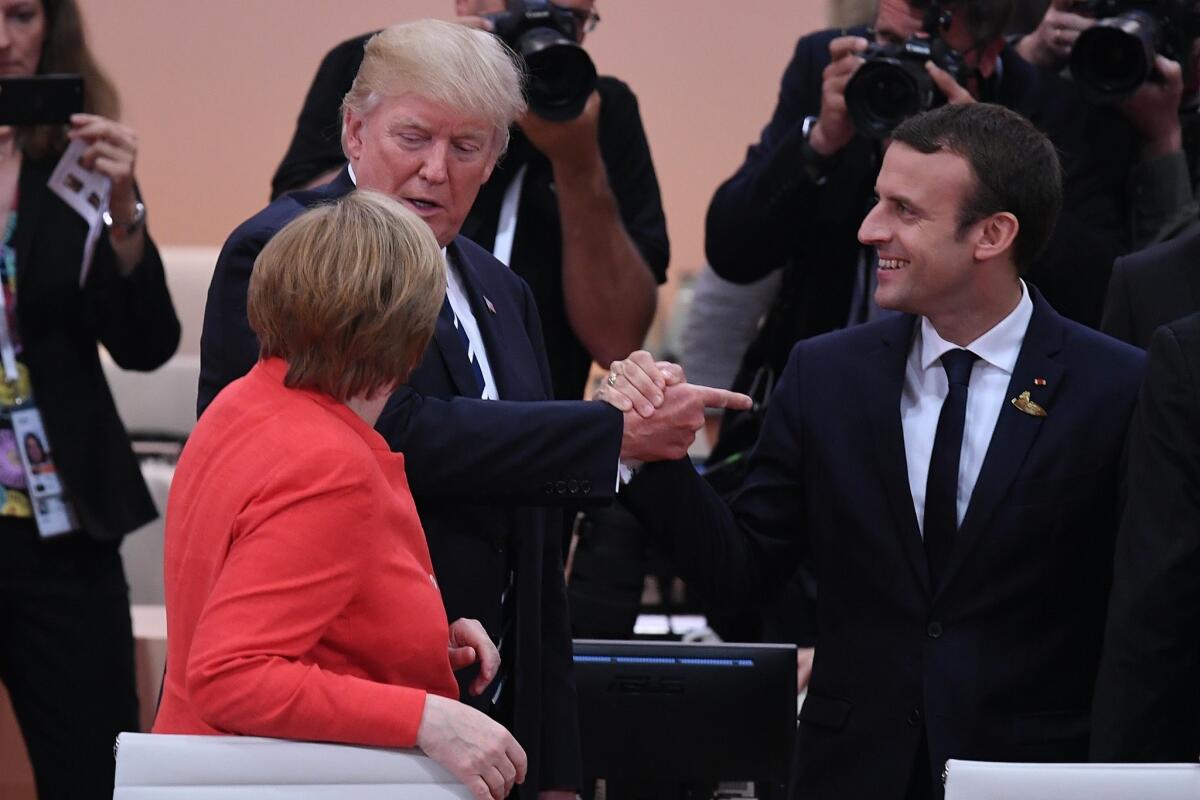Column: Coronavirus is a global crisis. ‘Every country for itself’ doesn’t work

- Share via
Has there ever been a crisis as truly global as this one? If I email with my cousin Susanne outside Vienna, she’s locked in her house, avoiding the virus. So is my old colleague, Said, who is at home in his apartment in East Jerusalem. So was Luly in Beijing, until a few weeks ago when restrictions there were eased.
This microscopic virus knows no national borders. And it kills indiscriminately — Italians as well as Iranians, Americans as well as Russians.
There are a couple of ways to respond to this if you’re Donald Trump or Xi Jinping or Angela Merkel. You can conclude, quite rationally, that we’re all in this together and that we need to reach out across borders and oceans to encourage cooperation to understand and beat back the pandemic that threatens us all.
Or, you can hunker down inside your own country, bar outsiders from entering, wrestle other nations for scarce resources, seek your own cures and hurl blame at each other to divert attention from your own mistakes.
Guess which of those two approaches our country has opted for?
That’s right!
Among other xenophobic responses, President Trump has repeatedly called COVID-19 the “Chinese virus,” tried to ban the export of protective masks, cut funding to the World Health Organization and declined to participate last week when world leaders pledged cooperation on vaccines and treatments.
But it’s not just Trump who is misbehaving. China has falsely blamed the U.S. for the coronavirus outbreak, has spread disinformation on social media to sow panic and has been less than straightforward about its caseload numbers.
For that matter, European countries didn’t do much for their Italian neighbors in the early days of the pandemic. Instead, several imposed export bans on vital medical equipment.
But it is glaringly obvious that global crises require global solutions, and that “every country for itself” is exactly the wrong rallying cry. We need to share information about the transmission and spread of the disease in every country; we need to share research on treatments. Other international disagreements should be put to the side while we speed up testing and get ventilators, masks and equipment to wherever they are needed,
In the more congenial days of the Ebola epidemic, the HIV/AIDS crisis and the SARS outbreak, the United States worked closely with other countries, and with the World Health Organization, other United Nations agencies and humanitarian groups to lead recovery efforts.
“In the 2014 Ebola epidemic, the U.S. Centers for Disease Control took over at the operational level. We helped create emergency hospitals; we were training people,” said Dr. Barry Bloom, a professor at the T.H. Chan School of Public Health at Harvard University. “China worked in some countries, France was in francophone countries. We divided the world, with different countries taking different roles, but coordinated. There was a lot of shared knowledge and information.”
Another example: In 2004, President George W. Bush set up the President’s Emergency Plan for AIDS Relief, in an attempt to help African countries protect themselves from the disease. Rather than eliminate it because it was started by his predecessor, President Obama expanded the program, which funds anti-AIDS work in 60 countries and which has been credited with saving millions of lives. PEPFAR is considered one of the most successful global health initiatives ever undertaken.
This time is different. The U.S. and other countries are turning inward.
Sure, at the doctor and scientist and lower governmental level there’s some cooperation. The CDC, for instance, still has offices around the world, although their budget has been cut since 2016, says Bloom.
But as William Burns, former deputy Secretary of State and president of the Carnegie Endowment for International Peace, says, the right tone needs to be set at the top.
“What sets us apart from lonelier powers like China and Russia is our ability to build alliances, to mobilize other countries, to influence international institutions,” says Burns. “That’s a capacity the United States exercised for many decades in crises.”
But not these days. Two separate forces are standing in the way of a strong response by the United States and the so-called post-war liberal international order. One is what Charles A. Kupchan, a professor of international affairs at Georgetown University, called “an unstoppable shift in the global balance of power” away from the U.S. and its democratic allies. By 2030, if current trends continue, the world’s leading economic power will not be a democracy at all; it will be China.
The second force is the increasing movement toward populism and nativism in many of the world’s democracies, Kupchan said, including the United States.
COVID-19 is, among other things, a test of the world’s ability to respond to emergencies in the future. Next time, it may not be a pandemic, but a bioterror threat, a nuclear incident, a global financial meltdown or an international cybercrisis. None of those can be addressed from behind defensive walls.
The biggest threat of all is global climate change. If COVID-19 offers any lessons for that looming disaster, they are that we should not dismiss science so cavalierly, not blithely ignore what’s barreling toward us, and not retreat into our own narrow worlds.
As this crisis has made clear, what harms our neighbors is likely to harm us too, and what protects us, protects them. We are all in this together.
Twitter: @Nick_Goldberg
More to Read
A cure for the common opinion
Get thought-provoking perspectives with our weekly newsletter.
You may occasionally receive promotional content from the Los Angeles Times.











